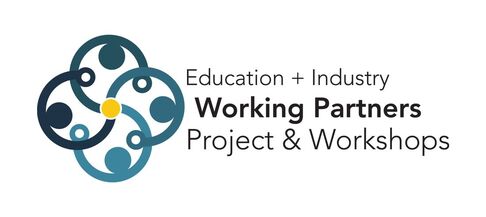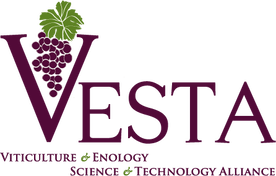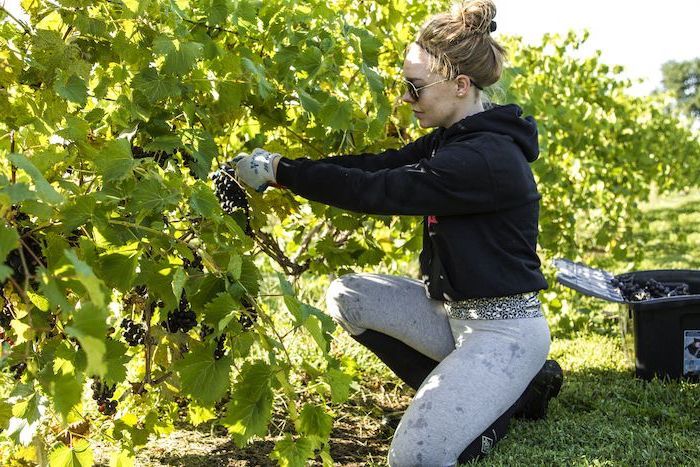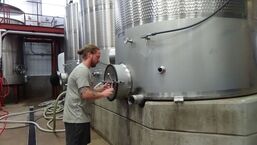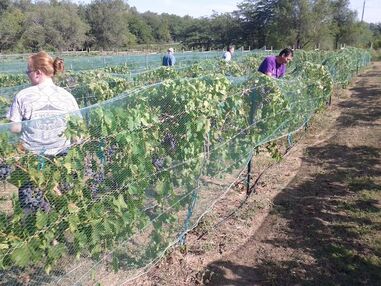|
Job Shadow to Apprentice: Augmenting Online Coursework with Field Learning
Viticulture & Enology Science & Technology Alliance (VESTA) Resource Center, Missouri State University
Key Outcomes
- Developed ongoing partnerships between academia, marketing, and industry
- Established curricula that blends online learning with mandatory workplace-based experiential learning
- Incorporated knowledge and skills of industry professionals into program materials and methods
- Created and maintains a network of professional contacts accessible to students and alumni
- Increased student career awareness and employment opportunities
- Improved the diversity of the viticulture/enology industry
Summary
The Viticulture and Enology Science and Technology Alliance (VESTA) has blazed a path for “a 21st century vision for education in grape growing and winemaking” by utilizing a flexible online curriculum, developed in collaboration with industry professionals, and pairing it with field- and industry-based required experiential learning that students undertake in their respective regions.
|
VESTA’s extensive professional network informs the program's coursework and curricula so that graduates are competitive hires in the wine and grape industries and also provides on-the-job field placements for students to obtain hands-on experience and employable skills. In return, VESTA supplies industry with work-ready students and graduates and supports their integration into these sectors. VESTA also tracks and disseminates data and insights regarding viticulture and enology workforce and hiring trends. The programming that VESTA supports relies on two types of key partnerships. The first involves the VESTA Alliance network of academic partners; these programs offer and market courses and curriculum, and oftentimes establish initial connections for VESTA with the grape and wine industry in their respective states. |
|
“Industry gets involved with us because, ultimately, they are helping themselves. By supporting our efforts to grow a knowledgeable workforce - one that can make good product, grow good grapes - they help themselves grow.” Michelle Norgren, PI |
The second type of partnership establishes relationships between VESTA and the industry it serves, and is often developed from these industry introductions and through outreach performed by state coordinators and VESTA itself. Industry partners provide critical field sites that allow students to complete required hands-on training and skills mastery, guide curriculum development by providing feedback on courses and curricular developments, and contribute updates on technical and market developments, as well as changes in industry-relevant skills and abilities. As a result, professional skills and knowledge common to the viticulture/enology industry are built into VESTA’s curriculum. |
Experiential, workplace-based learning is also built into the program, necessitated by the fact that the coursework is designed to be delivered entirely online. To ensure that graduates are appropriately skilled for positions in grape-growing and winemaking, students are required to seek out and complete on-the-job experiential learning experiences explicitly tied to their coursework, beginning with introductory courses and throughout their program of study. These typically begin as simple job shadows or site visits but, as students advance in their studies, the complexity of the assigned duties and amount of time students spend in the field increases, culminating in a practicum or apprenticeship-style intensive final course.
|
The logistics of these experiences begin with students securing a mentor who will take them on for a specific course; finding mentors is expedited through use of the extensive Alliance network and database, although students often seek out new placements based on interest or locality. The student and mentor complete site forms, and submit the information to VESTA. Once VESTA receives confirmation from both student and mentor regarding the match, VESTA sends a “mentor packet” of information that includes specific tasks and skills to be mastered for that particular course, and a timeline by which certain tasks should be completed. Minor adjustments can be made to the assigned outcomes by the mentor and student depending on specific career goals or concentrations for a particular student. A minimal honorarium is made available to the mentors but 80% do not claim the stipend and instead offer it as a donation to the program. |
Field experiences are tied to the classroom; the course they’re in determines what they do in the vineyard or winery and the requirements they need complete. And the experiential learning builds and is integrated. In Intro to Viticulture, they’re only going to do 16 hours in the vineyard. The next course builds on the on-the-job skills they've acquired and requires a greater number of field hours , and so on, culminating in a very intensive internship. Michelle Norgren, PI |
|
This combination of mastery of concepts via online coursework with increasingly demanding real-world experiences that build practical skills through on-site learning has proven to be highly successfully, especially in accelerating graduate placement. In fact, oftentimes students are hired part-time by their mentor sites even before they graduate and later become full-time employees. According to director Michelle Norgren, for the wine industry in particular, ensuring that education and training pathways produce skilled, ready-to-work graduates is a win for all. |
Impacts
- Workplace-based learning experiences often result in employment opportunities
On-site field experience with real industry partners allows students to master key skills but also to learn how things work at that specific employer, often resulting in early placement or being considered for employment when a job opportunity comes up. Many VESTA graduates are now mentoring students.
|
- Instructors and field mentors can focus on student learning
Because instructors are primarily industry leaders already busy with their day jobs, VESTA handles logistical details of lesson content and scheduling. As a result, the student-instructor relationship can focus on achieving skill mastery and employment readiness rather than administrative details. - Increased diversity in the wine industry workforce
VESTA is committed to increasing the workforce diversity in these fields and, based on collected demographic data, the program is seeing an increase in groups typically underrepresented in the industry as a whole. The curriculum’s accessibility, delivered online with regional applied learning requirements, also makes it a viable career path for non-traditional learners and veterans.
Challenges
- Ensuring field site quality
VESTA state coordinators cultivate and maintain an awareness of the quality of regional vineyards and wineries for student placement but judging the appropriateness of a new field site, especially one solicited by a student, is often difficult until student feedback is available.
- Aligning programming with seasonal cycles
Given the agricultural cycle that drives the wine industry, students are best served by directly experiencing the work required during each of the four seasons. As a result, VESTA’s courses not only must be relevant to the season in which they’re taught, but also combine in a way that provide students with full exposure to annual industry expectations. - Maintaining student awareness of mentor and business needs
Students are taught to be sensitive to the needs of the mentor – often the business owner or manager – and to be observant and respectful of the needs of the business and of any equipment they are entrusted with using..
- Ensuring industry partners adhere to program requirements and expectations
VESTA has established over 550 successful field sites yet occasionally students are assigned to roles that do not stay true to the requested skills for a particular course or placement. VESTA must work with students, faculty and state supervisors to identify and resolve such issues.
- Tracking alumni successes
As with many other programs who utilize surveys to track their alumni, response rates can be low, so updates usually come from state-wide meetings and talking to graduates one-on-one. VESTA is looking for a better way to keep track of how former students are integrating into industry, and their long-term successes.
Implementation Strategies
|
“To build the network, we started with myself here in Missouri, and our state coordinators in Illinois and Iowa, basically canvassing our states, knocking on proverbial doors, making visits, etc. We did a lot of reaching out to make connections early on. As the program grew and the activities of VESTA became more known, in-the-field recruitment became less and less necessary.” Michelle Norgren, PI |
- Maintain your partnerships
It is critical to keep current with your partners, in our case both industry and education-based. This can be anything from a simple annual call to a formal scheduled review. The format depends on the relationship but make sure you keep aware of the successes and, importantly, the challenges your partners are facing. - Dedicate staff to build and maintain your partnerships
While most programs are not able to budget for additional administrators, having someone assigned to track and maintains partnerships is extremely helpful. Within the VESTA national network, some of these duties are fulfilled by state coordinators who stay current on industry developments within their state, identify and recruit potential new partners, and communicate, support and monitor vineyards and wineries that serve as field sites for students.
Additional Resources
|
Subject Information
|
